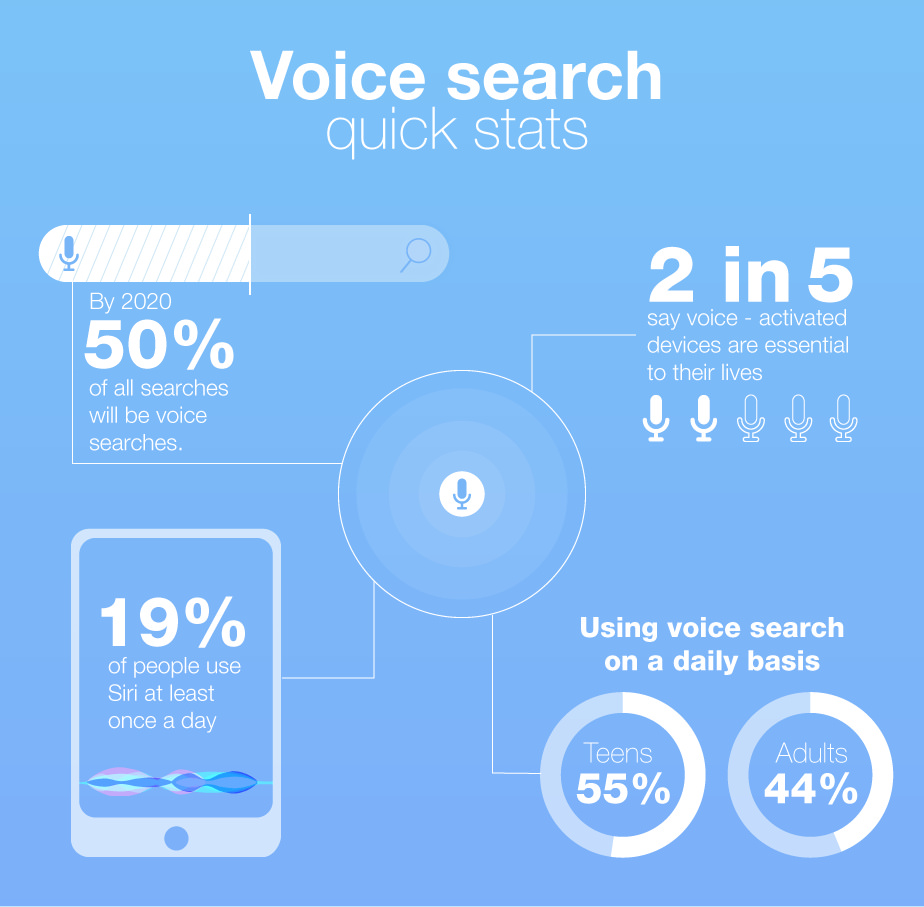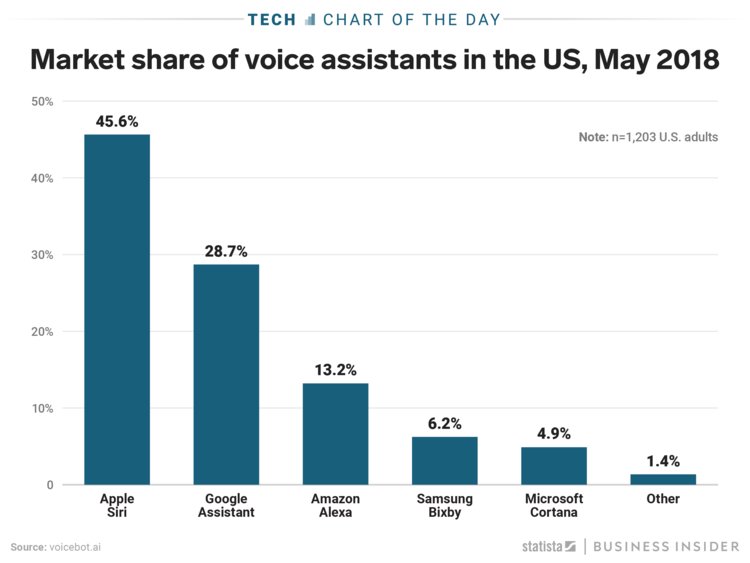Voice search has ushered in a new revolution in the world of digital marketing. A trend that started in 2011 with Apple’s SIRI underwent a rapid growth within a short span. Did you know that today, 20% of all the searches conducted via Google, (which is roughly estimated to be over 100 billion) are voice-based search? This means, in 2019, approximately 2.75 billion Google searches are voice searches. Baffling, isn’t it?
Well, this is what the future has in store for us
Source: wpengine
Maybe someday, in a not so distant future, our daily lifestyle will resemble the Starship Enterprise. Soon we will be barking out voice commands to an omnipresent and invisible computer to turn up the heat, change the TV channel, switch on the lights and turn off the oven. And these narratives are not restricted to science fiction movies any longer. In certain parts of the world, Smart Homes are already a reality.
Also Amazon Echo, Google Home, and Apple SIRI are pushing aggressively to replace the keyboards and buttons with voice commands and promoting rapid growth of Smart Home Technology.
Source: businessinsider.com
This is because the AI technology behind voice search has gradually evolved to become tremendously accurate. As per Google, the precision of voice recognition technologies has developed to 95% since 2013. More so, due to Google’s Hummingbird update.
The term (Hummingbird) has been derived from the name of a bird which signifies “speed and accuracy.” This update has made the search engines much quicker, comfortable and intuitive. Hummingbird is committed to an increasingly sophisticated understanding of users ‘intent’ behind the search queries with the precise goal of matching them to better and more relevant search results.
Experts speculate that this update ushered in new developments in the field of natural language processing (i.e. the process that enables machines to interpret and parse human speech). Since then, it was the driving force behind the advancement of semantic search. Just look at how accurate Google Now has become since the time of its inception. This very phenomenon was suggestive of the fact, that very soon, natural language processing or voice search is going to occupy a major space in Google’s search algorithms.
This raises some pertinent questions; what’s the reason behind this wide acceptance of voice search? Most importantly, how much will it affect the current SEO and content strategy of digital marketers?
Before we dive into these details, let’s try to understand what exactly voice search is and how it works.
So, what is voice search?
Voice search is basically a speech recognition technology that also takes into account ‘search engine keyword queries’ like find near me and it enables the users to perform a search via voice command (i.e. speak the questions instead of typing them). It allows the users to conduct internet searches by speaking directly into a computer, mobile phone or voice-activated devices, instead of typing the search query manually.
As the voice search technology has become more versatile over the years, users have realized the benefits of using voice commands to generate answers to their search queries. Some of the top reasons people use voice searches as:
Voice search allows the users to multitask.
It enables them to find answers to the queries much faster than typed search queries.
Voice search empowers them to get the most accurate answers instantly.
While many people are still in the process of learning and adopting the benefits of voice search in generating information, most users are extremely pleased with its results (as this valuable tool simplifies the search process by generating quick, easy and concise answers without interrupting the daily tasks).
How does voice search affect SEO?
As this trend continues to grow exponentially, experts estimate that by 2020, more than 50% of the searches will be voice-based.
So, now the question is if voice search is rising at this massive rate, will it affect your SEO marketing strategies as well? Of course, it will. Let me explain it a bit further to you.
Source: bluecorona.com
Computer algorithms have undergone a massive evolution
In basic optimization techniques, you didn’t have to rank number 1 in the search results. A position on the first page of the SERP’s was considered a win. Then gradually, SEO became essential to improve a website’s visibility, quality/ quantity of website traffic, as well as exposure to the brand. Since then, marketers have been invested solely to come up with a perfect solution for improving their website’s rankings on the search engine results.
The recent developments in the voice search arena have affected the SEO industry to a great extent. This is because; the latest virtual voice assistants and smart devices actively listen to the voice commands and speak out the results aloud. And, as there is only one spoken result in voice searches, it brings much more pressure to the local businesses. Therefore, incorporating voice search technology into marketing ventures has become vital for
enterprises and local businesses nowadays.
A Bonus Tip for You
Here’s a tip of advice, think of voice search as an additive to your SEO content strategy and not a deduction. It’s important to remember that you must not completely divert your focus from traditional search queries in order to improve your voice search SEOs. The best content strategy is maintaining the SEO for traditional web searches as well, in addition to the voice search. The continual inspection and evaluation of the search engine results and voice search results will give you the much-needed insight into the relevant keywords you must attempt to target.
How Can You Improve Your Ranking in the Era of Voice Search?
As you can see, it becomes essential to customize the website contents based on how users will speak about a product while searching for information in order to rank higher in the search engines. Google Home, Amazon Echo, and Apple’s HomePod are also incorporating screens so that the voice search query answers can be presented visually as well.
If you still haven’t yet started to optimize your website for voice search, you must get on with it right away. Here are 4 SEO strategies you need to adopt today,
1. Focus on the semantics
In the case of text searches, people mostly type “best Japanese restaurant in Denver”. But in case of voice search, they are likely to ask, “Is there any good Japanese restaurant near me?” Starting from the very words we use to the way we articulate our thinking, all are very different in case of voice searches and compared to text. As this mode of search become more and more prevalent over the years, marketers will need to modify their content in a more conversational tone to fully optimize their website.
Try to include phrases like “Searching for good Japanese restaurants near you?” “Instead of opting for a good, indulge in the best Japanese delicacies.” “People consider us to be the best Japanese restaurant in Denver.” within your content. This will improve your chances of getting featured in the most coveted “position zero” in the search engines.
2. Focus on mobile views
Most of the search engines are shifting their focus to prioritize mobile searches as opposed to computer searches. As voice recognition continues to rise, marketers will need to focus on optimizing their sites for Smartphones and Tablets (essentially the mobile devices). Choosing a relatable and responsive web design, getting rid of flash, compressing the images can be an excellent starting move.
Also remember, the mobile-friendliness of your website will be assessed on a ‘per page basis’. Therefore, it will be essential to check each of the landing pages one at a time for mobile-friendliness. And the easiest and quickest way to do it is to perform the check with Website Auditor- Google’s mobile-friendly test.
Here’s a detailed guide for making your mobile site flawless and specially optimized to appear in the top mobile search results.
3. Focus on long-tail keywords
Long-tail keywords have always been important for web content optimization. Moreover, this newest evolution of voice recognition has added to its importance manifold. This means you must be prepared to analyze your content thoroughly and deform it into question-based searches. Since spoken words contain a lot more words than a typed search command, e.g. “What is the best massage parlor near De Dam in Amsterdam” Vs “best massage parlor near De Dam Amsterdam,” you can make use of these extra words to rank higher. (People generally tend to use terms like ‘best’ and ‘nearest’ for relevant results, so keep that in mind as well)
Another great way to answer the questions is by adding FAQs to your site. Prepare a questionnaire to access the typical questions consumers are likely to enquire about your product and write short and relevant answers for them. The search engines consider short and to the point solutions while replying to voice search commands.
4. Focus on location-based search
Voice search prioritizes local SEOs mostly due to the popularity of mobile devices. Do you have a brick-and-mortar store where your customers come to shop occasionally? Then it will be crucial to rank the highest in the local search results. And with the significant evolution of voice search, it will be more important than ever before.
Here are the essential things you must pay attention to, in order to improve your local search results:
• Reviews
• Googles My Business Page
• Post Videos
• Schema Markup
When positive reviews and relevant videos crop up in the search results (As people commonly search for “Which restaurant has the best reviews” or “Best method to apply mascara”) you website will automatically gain more
traffic.
Once you have tweaked your website accordingly, test your voice search strategy using different devices like, SIRI, Cortana, Alexa, and Google Assistant. Check where you rank in the common search questions and where you are standing as compared to your competitors. As the technology keeps upgrading and evolving each day, you must test the website performance frequently, to determine its performance accurately.
Finally, all I can say is, voice search is here to stay. This brings excellent opportunities for some marketers. However, some dread that this cut-throat competition will pose a serious threat to their online survival.
Should you be worried? Hmmm, that will totally depend on the type and quality of your content. In order to get your website ready, go through your content carefully and ask yourself, “Does it answer the questions ‘Ok-Google’ (Question)?” And there lies your answer.



